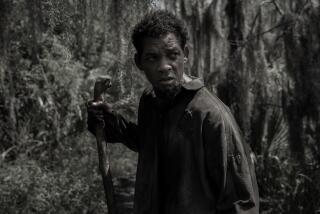Tobacco’s troubling legacy
- Share via
“Bright Leaves” is yet another of documentarian Ross McElwee’s droll, irresistible, multilayered, multifaceted journeys through the beguiling yet contradictory land of his youth, North Carolina -- and inevitably through his own heart and soul. McElwee, who has chronicled his coming of age in such landmarks as “Sherman’s March” and “Time Indefinite,” now lives in Boston with his wife and young son but from time to time needs to reconnect with his relatives, friends and native region, connecting past to present while playing with and contemplating the documentary form itself.
This time he visits a second cousin, an avid film fan he has never before met, and through him discovers a movie he never heard of, “Bright Leaf,” a 1950 Michael Curtiz-directed melodrama in which Gary Cooper plays a 19th century tobacco farmer whose story parallels that of McElwee’s great-grandfather. James Harvey McElwee created the Bull Durham tobacco brand only to lose it in a long and costly legal battle with James Buchanan Duke. In court McElwee won on points but lost on appeals; relatives and historians tell McElwee they suspect payoffs on Duke’s part. In any event, Duke would soon make Durham the tobacco capital of the world.
McElwee contrasts the obscurity of his great-grandfather and the enduring eminence of Duke. But in pondering what-ifs (i.e, what if it were McElwee University instead of Duke), visiting sites connected to his great-grandfather’s life and wondering if “Bright Leaf” was inspired by his great-grandfather’s life, McElwee sidles up to what’s uppermost in his mind: North Carolina’s troubling tobacco legacy. The personal odyssey that is “Bright Leaves,” as with all of McElwee’s movies, allows it to embrace and confront the ravages of smoking -- of how the crop that still contributes to the state’s economy also contributes to the demise of so many of its citizens.
Everywhere McElwee, an ex-smoker, goes he encounters most everyone smoking. Charleen, McElwee’s high school teacher and a familiar presence in his films, tells him how her sister is near death from smoking. McElwee observes wryly that for his family tobacco, despite his once-wealthy great-grandfather’s bankruptcy, has been an “agricultural-pathological trust fund.” In other words, his grandfather, father and brother became surgeons and profited from treating tobacco-related diseases. McElwee acknowledges the pleasures of smoking, of its ability, like film itself, to make time seem to stand still.
In exploring the yearning to create and preserve family mythology, in evoking a Southern way of life that endures change -- in exploring so many aspects of human emotion and experience in life’s eternal cycle -- “Bright Leaves” provides a context in which addiction to tobacco takes on a truly tragic dimension. Inevitably poignant but also often amusing and always deeply touching, this film is likely to stick in one’s memory for all its concerns, not just cigarettes.
*
‘Bright Leaves’
*
MPAA rating: Unrated
Times guidelines: Mature themes, suitable for older children
A First Run Features release. Produced, directed, filmed and written by Ross McElwee. Editors McElwee, Mark Meatto. Running time: 1 hour, 45 minutes.
Exclusively at the Music Hall, 9036 Wilshire Blvd., Beverly Hills,
(310) 274-6869.
More to Read
Only good movies
Get the Indie Focus newsletter, Mark Olsen's weekly guide to the world of cinema.
You may occasionally receive promotional content from the Los Angeles Times.










